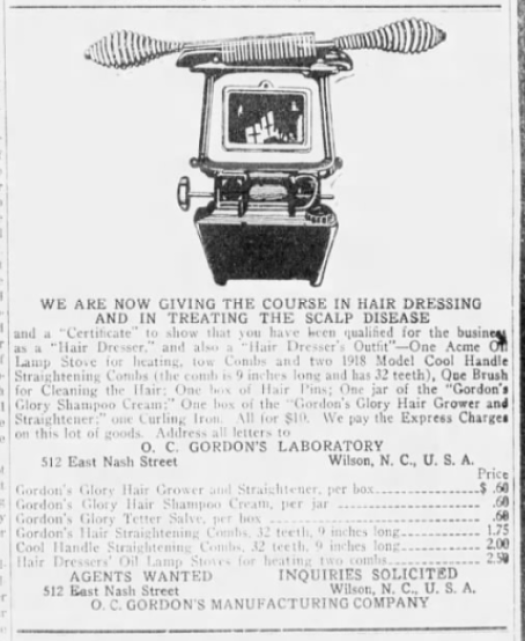Just when I thought I could not be further surprised about Black Wilson came this glorious ad for Gordon’s Glory Hair Dressing Parlor.

Wilson Daily Times, 10 August 1920.
Yes, for a while, Wilson had its own entrant in the early 20th-century battle for Black hair care supremacy.
Before Wilson, Oscar Gordon was in Winston-Salem, N.C. It’s not clear when he developed his hair care formula or when he opened his laboratory, but in September 1916, there was this:
Twin-City Daily Sentinel, 12 September 1916.
Gordon registered for the World War I draft in Winston-Salem in 1917. His card notes that he was born 29 June 1888 in Kittrell Springs, N.C.; lived at 209 Fogle; was single; and worked as a self-employed laborer. Later that year, he placed this modest ad for for his Glory Hair grower.
Winston-Salem Journal, 27 October 1917.
By 1918, Gordon had relocated to Wilson and was placing ads in newspapers across the country touting his “course in hair dressing” (which included a certificate of qualification and a “hair dresser’s outfit” of tools and creams) and various products developed by “O.C. Gordon’s Laboratory” and for order from his manufacturing company at 512 East Nash Street.
The illustration shows the “Hair Dressers’ Oil Stoves for heating two combs.” Birmingham Reporter, 17 August 1918.
Gordon placed this testimonial ad close to home:
Gordon’s Glory in its tin box. Wilson Daily Times, 25 June 1919.
Gordon also placed an ad for a “lady bookkeeper”:
Wilson Daily Times, 3 October 1919.
The 1920 Hill’s Wilson, N.C., city directory lists O.C. Gordon Manufacturing Company, a maker of toilet preparations, at 512 East Nash Street. Oscar C. Gordon, its proprietor, lived at 521 East Nash.
By late 1920, Gordon had expanded his product line to include face powders (in “good brown,” pink and white) and hair pullers (“unnecessary to wrap rags around the handle” — something like a flat iron?)
Birmingham Reporter, 11 December 1920.
As first seen in 1917 in Winston-Salem advertising, a la Madam C.J. Walker, Gordon occasionally intensified his branding to include a photograph of himself in a tie and high detachable collar — and a magnificent head of flowing hair.
He has restored hair on thousands of bald heads. Wilson Daily Times, 1 July 1921.
In the 1922 directory, Gordon is listed as a hairdresser at 511 East Nash. His factory is not listed. The 1922 Sanborn map of Wilson shows a hairdresser at 513, and at 511 a presser, which generally meant a clothes presser. The site is now a parking lot.
1922 Sanborn fire insurance map, Wilson, N.C.
Soon after, Oscar Gordon took his talents to New York City, where he set up shop in Harlem at 267 West 144th Street.
“Use Gordon’s Glory Hair Grower for that bald spot and be convinced.” Wilson Daily Times, 21 January 1926.
He was still in business in 1930, advertising face bleach and black hair dye in addition to creams and combs. An ad placed in 1933 in the New York Age shows Gordon weathered the early years of the Great Depression.
Wilson Daily Times, 29 March 1930.
In 1942, Oscar Caroline Gordon registered for the World War II draft in New York City. Per his registration card, he was born 29 June 1888 in Kittrell Springs, N.C.; lived at 147 West 143rd Street, Apartment 1; his contact was Mrs. Brown at the same address; and he was a hairdresser with his own business at that location.
It’s not entirely clear, but it appears that Oscar C. Gordon died in New York City in 1983.
I’ve found much less about Gordon’s assistants. Madame Bell Malone left no trace in Wilson at all. Madame Alma Pouncey’s time there is also difficult to trace. An Alma Pouncey, 24, married Will Hemmingway in Wilson in 1915 (well before Gordon’s ad called her by her maiden name). Their marriage license provides no other personal details. Lucin Hemingway was born 31 August 1918 in Tanner Creek district, Norfolk County, Virginia, to Wm. Hemingway, 41, laborer, of South Carolina and Alma Pouncey, 20, laundress, of South Carolina. Alexander Dudley Hemingway was born (and died) 12 August 1919 in Bennettsville, Marlboro County, South Carolina, to William Hemingway of Richmond, Virginia, and Alma Pouncey of Marlboro County.
In the 1920 census, Will and Alma Hemmingway and their son Will Jr. were working as farm laborers in Clio, Marlboro County, South Carolina. (Did the Hemingways move to Wilson later that year?) On an unknown date, Alma Holmes applied for a delayed birth certificate in Marlboro County, S.C. Per the application, she was born Alma Pouncey on 17 November 1900 in Bennettsville, S.C., to Lucien Pouncey and Ida Swinney, both now dead, and resided in New York City. Alma P. Holmes died 16 June 1952 in Bennettsville, S.C. Per her death certificate, she was about 52 years old; was born in Marlboro County, S.C., to Lucious Pouncey and Ida Swiney; was the widow of Roudalph Holmes; and worked as a seamstress. Ethel L. Grace was informant.









